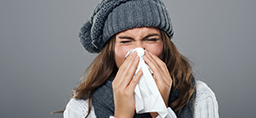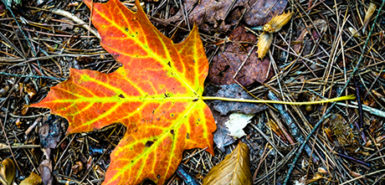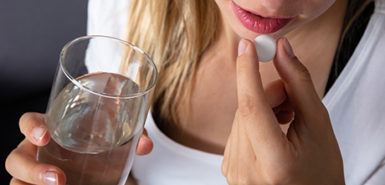
Fall has arrived and that means hayrides, pumpkin patches and corn mazes are beckoning us outdoors. But it also means fall allergies, which can pack a serious punch for many Midwesterners.
In Michigan, allergists expect to see higher pollen counts sneaking in very soon, Ted Kelbel, MD, section chief of allergy and immunology at Spectrum Health, said.
“Fall pollen levels can be quite high,” Dr. Kelbel said. “We have large amounts of pollen being produced by ragweed and other fall weeds that are in peak season right now.”
The Michigan climate always generates solid pollen production, Dr. Kelbel said.
And in the fall, certain molds activate. Ragweed and other weeds produce quite a bit of pollen, kicking up by mid to late August.
Allergy symptoms can include sneezing, nasal drip and throat clearing.
“We always see patients who struggle with this,” Dr. Kelbel said.
Remedies that work
If you’re hoping to escape the pollen completely, you’ll have little luck. Pollen can travel about 80 miles once it’s airborne, Dr. Kelbel said.
But you don’t have to suffer through miserable symptoms. There are ways you can reduce your pollen exposure or manage symptoms:
- Keep windows closed on high pollen level days and run air conditioning to filter the air in your home.
- If you’ll be outside for the day, proactively take an over-the-counter antihistamine.
- After mowing the lawn, pollen will stick to you and make its way inside the house. Take a shower and change your clothes once you come inside.
- If an antihistamine doesn’t work, try a nasal rinse.
When it comes to medications, there are first- and second-generation antihistamines.
The second-generation medications make you less drowsy, Dr. Kelbel said.
“If you find a medicine that works, you can stick with it,” he said. “These medications are safe and inexpensive, so you can try different brands until you find the right one.”
If symptoms persist, nasal steroid sprays are available over the counter. They can control symptoms a little better.
“With nasal sprays, you need to take it every day,” Dr. Kelbel said. “They don’t work as well intermittently.”
If these options don’t work well, you can talk to your doctor about other treatment possibilities. You could even consider allergy testing, he said.
“If allergies are getting in the way of you enjoying the beautiful summer and fall activities, there’s a lot that we can do to help improve your health,” Dr. Kelbel said. “We want to get you back out there playing sports, going on hikes and enjoying the Michigan summer and fall months.”
 /a>
/a>
 /a>
/a>
 /a>
/a>